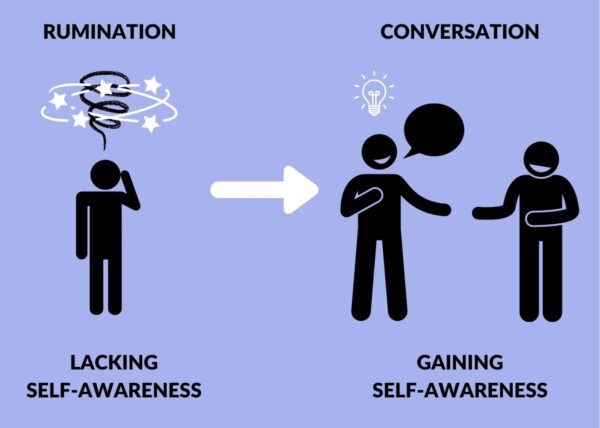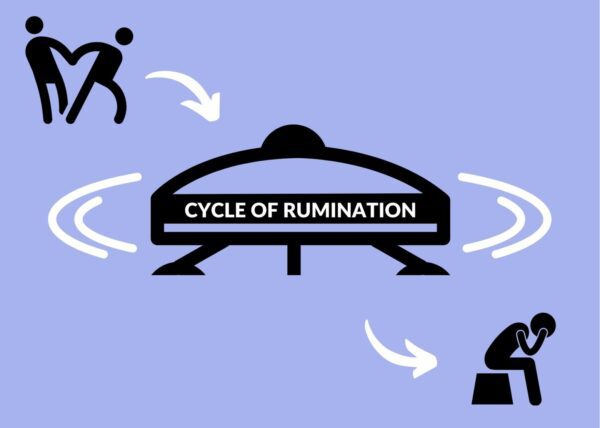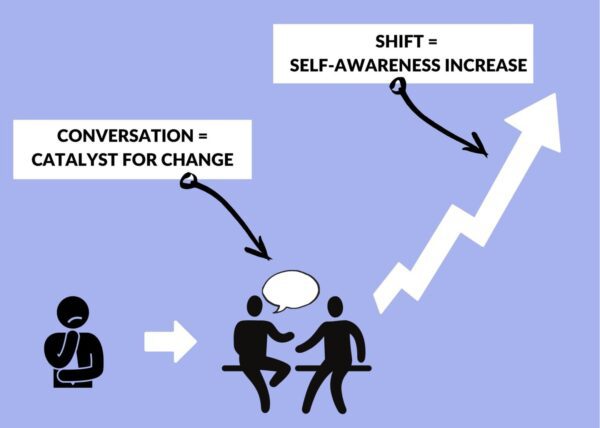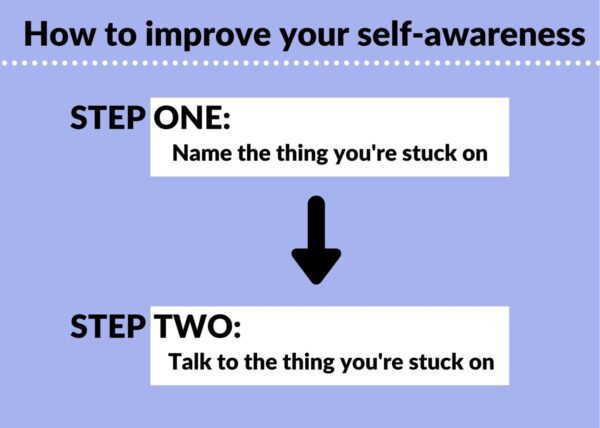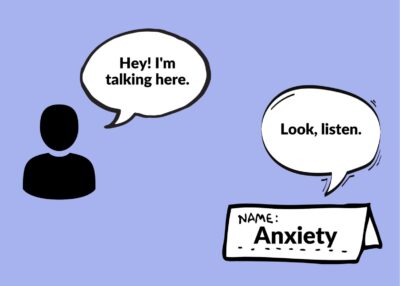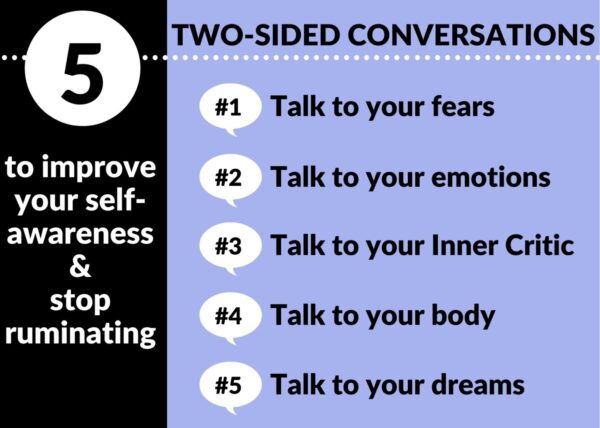If you’re looking for a powerful trick that will improve your self-awareness, you’ve come to the right place.
I’m the queen of rumination. If there’s a problem to consider or a decision to make, I will analyze it from every angle. And if it pertains to something I’m worried about? Forget it – I’ll be up half the night contemplating what I “woulda-coulda-shoulda” done.
Don’t get me wrong; my analytical mind has benefited me in many ways throughout my life. Additionally, my ability to ask questions has helped my relationships and self-discovery. I love diving into those hard questions that improve my self-awareness. (I didn’t name my blog My Question Life for nothing!)
But, on my questioning/analyzing ride, I sometimes blow past things that I should notice. What’s more, rumination begins to harm my self-awareness when I get stuck. The unanswerable “why’s” and continuous spirals blind me from the true self-awareness that will benefit me.
Fortunately, I began to find a solution to help get me “unstuck.” Whenever I began to ruminate, I would turn to my closest friends or my fiancé to talk about my issues. I’d do a verbal dump, we’d chat, and I’d come away from the conversation with much more self-awareness than before. I’d also begin to see a direction to move forward.
But what if you don’t always have access to these conversations? Read on to learn a simple trick that has the potential to drastically improve your self-awareness.
.
Why did conversations contribute so much to improving my self-awareness?
Self-awareness is our ability to identify and manage our thoughts, feelings, and behaviors. When we’re self-aware, we understood who we are and how we fit into the world. If it sounds simple, don’t be fooled – it’s not. Almost 90% of people think they’re self-aware when less than 10% actually are. (Want to test your self-awareness? Check out my free self-awareness test.)
Having conversations improved my self-awareness for several reasons. First, they got me out of my head; my thoughts literally came out of my head in the form of spoken words. Second, my friends gave me outside perspectives I couldn’t see myself.
And third, the conversations allowed me to see the things I ruminate about as separate from myself.
I can’t emphasize this last point enough. By talking about something, I could untangle it from my messy self-perception. This “step back” gave me an outside perspective that I couldn’t get while ruminating.
We falsely believe that rumination helps our self-awareness because it makes intuitive sense. How could thinking about ourselves not help us understand ourselves better? But rumination is a secret enemy of self-awareness. And it’s one many of us get caught in the clutches of.
.
Why Ruminating Works Against Improving Your Self-Awareness
When I was younger, my cousins and I always loved going to the local fair. Despite the off-putting smells and questionable mechanics, the amusement rides attracted our excitement. And we became particularly excited when the Gravitron ride rolled into town.
The Gravitron looked like a saucer spaceship on the ground. From the outside, the ride didn’t look like much in the way of thrill-seeking. It merely spun in a circle. The experience from the inside, however, felt quite different. Because of the force of motion, you could climb all over the walls and “defy gravity.”
It was one of those rides that was incredibly fun – until it wasn’t. After about two minutes, twinges of nausea struck my stomach, and a headache began to creep in. A feeling of entrapment began to take hold until the ride thankfully slowed to a stop.
But then, like clockwork, my cycle of amnesia would begin. I’d forget the unpleasant feelings in the coming months and remember that fantastic “gravity-defying” climb. By the time the fair rolled back around the next summer, I’d be jumping at the chance to ride the Gravitron again.
Rumination is kind of like having never-ending access to the Gravitron. From afar, it looks cool but not crazy. You want to go inside; your brain has remembered that it temporarily feels good. But once you’re inside, you’re stuck – with seemingly little agency over when you can get out.
We believe hyper-questioning of ourselves is helpful. We think that replaying the same things over and over again in our mind will unlock something new. In reality, we’re just spinning around, climbing walls in a way that isn’t natural or healthy for us.
.
How to Stop Ruminating and Improve Your Self-Awareness With Conversations
When we do things over and over again, our brains create neural pathways. Rather than face uncertainty, we default to what we know. This is what makes it so challenging to break habits and forge new ways of thinking.
Fortunately, it doesn’t take an enormous catalyst to shift our thinking (and get off the Gravitron). Sometimes we merely need a new component in the game to make our brains go, “Woah – this is new. Let’s turn Default Mode off and proceed cautiously.”
Conversations give us this new component; they provide an outside voice we haven’t considered before.
But many of us shy away from vulnerability. We feel like a burden on our friends, or we don’t have the friends to turn to in the first place. What do we do when we can’t find the conversations that will help us. As the hot feelings of shame and loneliness rise in our chest, we fail to see another solution. We can create conversations without other people. In fact, we can improve our self-awareness by having conversations with ourselves.
We merely need to name the thing we’re talking to.
.
Name the Thing You’re Talking To to Improve your Self-Awareness
When I tell you to create a two-sided conversation with yourself, what do you think of? If you’re like me, you probably begin to imagine a situation somewhere between slightly-loony and full-blown schizophrenic. (Like, somewhere between singing to your furniture and asking your microwave about the weather, perhaps?)
Well, suspend your skepticism for a moment, kind folks. Because if you’ve made it this far, you probably understand that we must enact a change to improve our self-awareness.
That change is simple. Step one: name the thing you’re stuck on. Emotions, fears, dreams, decisions – anything that’s got you feeling stuck, confused, or lost.
And this isn’t a symbolic suggestion. I’m talking literally name it, whether that’s call-it-what-it-really-is or pick-up-a-baby-names-book-and-bestow-a-name. Sometimes giving something a human name can help you even more. (I’m looking at you, Karen aka my most annoying insecurities.)
When we name something, we create a degree of separation between ourselves and the thing. A degree just big enough to give us a new perspective.
Once you’ve named your opposition, you can move onto step two: talk to it. Ask it questions. See where it’s coming from.
Listen to it without judgment – as a friend might do – and then decide how you should respond.
.
An Example of a Two-Sided Conversation to Improve Self-Awareness
Just last week, I felt gridlocked with anxiety over this blog’s new youtube. Only I didn’t realize it at first. I simply knew that I wanted to create a video post, and I couldn’t motivate myself to do it. What was getting in my way?
I had two options.
Option One: Ruminate.
Kara: Why can’t I motivate myself to do this? I want to do this. At least, I think I want to do this. Do I want to do this? Why do I want to do this? Why am I doing any of this? Maybe I can do it tomorrow. But why not today? I think I’m afraid to do it. But I also just feel tired. Is it something about me? I’ll make a plan for what I want to do. Let’s run through the plan again. (… repeat for two hours.)
Option Two: Name my anxiety and have a two-sided conversation.
Kara: Okay, what’s my hold up. Anxiety? Anxiety, what are you trying to say here?
Anxiety: Don’t do this. You’ll look stupid, and everyone will judge you.
Kara: But I want to do this. Maybe it won’t look stupid, and people won’t judge me.
Anxiety: People always judge each other.
Kara: Well, maybe some people will judge me, but not the ones that matter. And it’s worth the risk if I can make what I want to happen. I hear you, Anxiety, but I’m going to move forward this time despite your warnings.
Sidenote: I’d like to imagine that conversation happening in a Western saloon with dramatic accents and deadly glares. But all jokes aside, giving color and fun to these conversations helps take the pressure off yourself. Bonus points if you give people names to your fear, like “Chad.” Nobody likes you, Chad!
Conversations with ourselves don’t work because we get stuck in our heads. Conversations with named entities, however, will give us the self-awareness we’re looking for.
.
5 Two-Sided Conversations to Improve your Self-Awareness and Stop Ruminating
You can name almost anything in your life and it will help improve your self-awareness. However, here’s a list of two-sided conversations that you can have to bring more clarity into your life.
-
Talk to your fears
Fear is our primary motivator, whether we realize it or not. Our brains respond to fear based on our evolutionary survival instincts before we even have time to reflect. Unfortunately, we lose self-awareness in this quick fear-response process. Many people don’t even recognize that fear is driving them in the first place.
Talking to your fear might feel intimidating because you’re giving a voice to it. However, the opposite is true. Fear – and it’s cousins anxiety and shame – gain power in silence. When you name your fear and talk to it, you can begin to discern how to overcome it.
-
Talk to your emotions
If fear is our primary motivator, then a whole slew of other emotions are cheering behind it. There are a lot of obstacles working against us when it comes to naming our emotions. And, when we do identify them, we often don’t know what to do with them.
Even though it might feel silly, talk to your emotions. Try things like, Anger, what are you trying to say? Sadness, what are you doing here again? You might be surprised by what you discover. Ultimately, these two-sided conversations might also help you to uncover the hidden layers and triggers beneath the emotions.
-
Talk to Your Inner Critic
Ah, your Inner Critic! We all have one, even if it comes out in different forms. Your Inner Critic is the voice that keeps you in a puddle of self-judgment. It says things like, You’re not good enough. You shouldn’t do this. You’re wasting your time. (Among other harsh comments.) Some of our Inner Critics are so familiar to us, they feel like our own thoughts.
It’s not easy to fight against our Inner Critic, but it’s possible. The first step is to name it and talk back to it. More than likely, you’ve been listening (and believing) your Inner Critic for years. How can you make a logical case against it?
For this conversation, especially, you might find it helpful to choose a funny name, add an accent, or dress up your Inner Critic in a way that makes it less intimidating. Remember, you’ve been living in default mode for awhile and must learn how to adjust your thinking.
-
Talk to your body
As if talking to my thoughts were enough, now she’s telling me to talk to my body? Yes, yes, I am. Because most of us completely ignore our physical bodies. We treat our bodies like a vehicle to use. In reality, there’s a mind-body connection that we must foster.
It might be challenging to tune into your body after ignoring it for so long. That’s why having a two-sided conversation with your body will help improve your self-awareness. Give your body the room to be heard. Even better, have separate conversations with your different body parts. Ask them how they feel and what they need. These seemingly silly conversations will improve your self-awareness and your mind-body connection.
-
Talk to your dreams
Finally, I encourage you to talk to your dreams. Most of us don’t acknowledge that it’s vulnerable to think about our joys and hopes. Our society has made us equate our success with our worthiness. As a result, there’s added pressure on achieving perfection (especially when creativity’s involved).
Give your dream a name. By separating it, you can take some of the pressure off yourself. Your dream doesn’t reflect who you are – you’re merely the person trying to bring the idea to fruition. This shift might help you learn more from the process rather than fixate on the result. Ultimately, you can find more purpose in your life.
.
A Helpful Tool: Use A Journal to Improve Your Self-Awareness and Stop Ruminating
Some of you might have trouble having these two-sided conversations. And I get it; acting out a scene (whether it’s in our head or our living room) feels a bit odd.
If you’re looking for a helpful tool, consider picking up a journal. Journaling is an excellent resource that will improve your self-awareness and help you stop ruminating. Just as a verbal conversation gets words out through our mouths, journaling gets words out through our writing.
If you want to learn more about what journaling is and how it can help you improve your self-awareness, read my recent post on journaling for self-awareness.
.
Conclusion: Tips to Improve Your Self-Awareness and Stop Ruminating
Many of us get caught in cycles of rumination. It feels good at the moment, and we falsely believe thinking about ourselves must lead to improved self-awareness. Unfortunately, rumination leaves us stuck and blind to what we need.
The fictional names and two-sided conversations you have won’t immediately change your life. However, I guarantee you that they will help improve your self-awareness. Even though they seem silly, they will be the “kickstart” you need to open your mind up to new perspectives. Ultimately, you’ll allow yourself the opportunity to understand more than you ever did before.
Isn’t that worth trying? (Hey Chad, shut up! I know it feels stupid, but I’m actually a lot happier now without your bullsh*t!)
Want more tips on how to improve your self-awareness? Subscribe to get my free EBook: The Art of Being Self-Aware, as well as my weekly newsletter.


